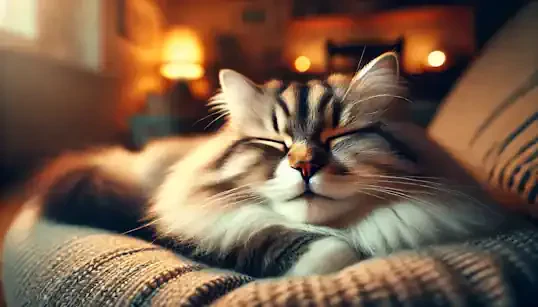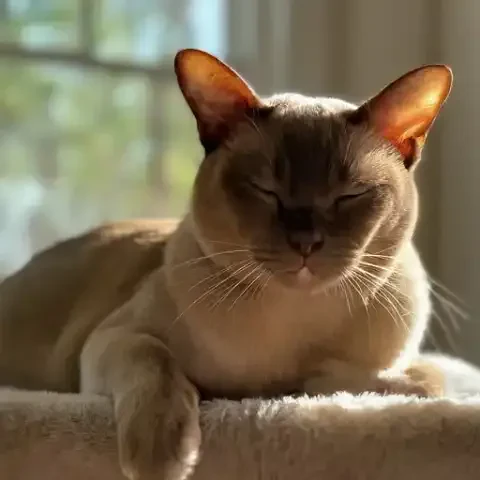That gentle, rumbling vibration, that soft, continuous hum – it's the unmistakable sound of a cat purring. It’s a sound that’s become synonymous with contentment, a feline lullaby that soothes both cat and human alike. We often instinctively associate it with a happy cat, curled up in a sunbeam, being gently stroked. But if you pause to truly consider it, have you ever really stopped to wonder why cats purr? What is the deeper story behind this iconic and utterly charming feline behavior?
Purring is a phenomenon that’s as familiar as it is fascinating, a core element of the cat-human bond. We intuitively understand it as a positive signal, a feline expression of comfort and pleasure. And while that’s certainly a significant part of the purr story, the reality is that the reasons behind a cat's purr are far more nuanced and multifaceted than simple happiness. It's a behavior that stretches beyond contentment, delving into areas of communication, self-soothing, and even, incredibly, self-healing. This exploration will take us on a journey beyond the surface rumble, aiming to unravel the layers of meaning behind the purr. We’ll discover that this seemingly simple sound is actually a complex and adaptable feline behavior, rich with implications for understanding our cats and deepening our connection with them. Let’s delve into the fascinating world of the purr, moving beyond the common associations to uncover the full spectrum of motivations that drive this captivating feline vocalization.
The most widely held and instantly recognizable interpretation of a cat's purr is, undoubtedly, pleasure and contentment. This is the purr we readily understand, the one that reinforces our affection for our feline companions. It's the sound that accompanies the moments we cherish: a cat nestled in our lap, a gentle head-butt against our leg, or the rhythmic kneading of paws on a soft blanket. In these scenarios, the purr truly does seem to be an audible expression of feline bliss. Think of the classic image of a cat being petted or stroked. The gentle touch, the rhythmic motion – often, within moments, a purr will begin to rumble to life. This tactile interaction is a powerful trigger for pleasure purring. The soft strokes along their back, under their chin, or behind their ears are often deeply satisfying for cats, eliciting that characteristic vibrational response. Similarly, consider the context of cuddling and relaxation. When a cat is curled up in a cozy spot, perhaps bathed in sunlight, feeling safe, warm, and undisturbed, the purr is often present. It’s as if the purr is the soundtrack to their feeling of security and well-being, a self-generated comfort blanket in sound form. Even the anticipation and enjoyment of food can sometimes trigger purring in some cats. You might hear a soft rumble as you prepare their meal, a pre-emptive purr of excitement and satisfaction at the prospect of a delicious treat.
The body language that accompanies pleasure purring further reinforces this interpretation. A relaxed posture is key - often a loose, almost languid pose, sometimes stretched out luxuriously or curled into a comfortable ball. Eyes might be closed or gently half-closed, conveying a sense of peacefulness and trust. Kneading, that endearing paw-pushing behavior, often accompanies purring in moments of contentment, a throwback to kittenhood and nursing. And the tail might be gently swaying or held loosely, further signs of relaxation. This whole symphony of purring and relaxed body language paints a clear picture of a cat experiencing positive emotions. This type of purring, the classic contentment purr, is deeply connected to feelings of security, comfort, and overall well-being. It’s the purr we recognize and cherish most, the one that strengthens the bond between us and our feline friends, reassuring us that they are happy and at peace in our presence. It’s a beautiful, audible confirmation of the positive emotions we strive to cultivate in our cats' lives.
However, the story of the purr doesn't end with simple happiness. Perhaps one of the most surprising and fascinating aspects of purring is its connection to self-soothing and even healing. It might seem counterintuitive, but cats often purr in situations that are far from pleasurable. Think of a cat at the veterinarian’s office, a place most cats find inherently stressful. Or a cat recovering from an injury, or even a mother cat during labor. In these instances, the purr isn't an expression of joy, but something altogether different. It’s a clue that purring serves a much deeper purpose, extending beyond simple contentment into the realm of self-regulation and physical well-being. The very situations that evoke fear, pain, or stress in a cat can also be purr-inducing. A vet visit, with its unfamiliar smells, sounds, and handling, is a prime example. A cat recovering from an injury, perhaps limping or wearing a bandage, might purr seemingly incongruously with their discomfort. Even during the intense physical process of labor, mother cats have been observed purring. These examples highlight that purring is not solely tied to positive emotions.
Scientists have explored the frequency range of a typical cat’s purr, which generally falls between 25 and 150 Hertz. Intriguingly, frequencies within this range correspond to those used in therapeutic applications, particularly in human medicine, to promote tissue regeneration and bone healing. This has led to the fascinating theory that cat purrs might possess inherent healing properties. The idea is that the vibrations produced by purring, within this specific frequency range, could stimulate physical healing processes within the cat’s body. Some researchers suggest these frequencies may promote bone density, muscle and tendon repair, and even pain relief. While definitive scientific proof of these direct healing effects in cats is still an area of ongoing research, the correlation between purr frequencies and therapeutically beneficial frequencies is undeniably intriguing and warrants further investigation. It’s important to note that the scientific evidence is still developing, and strong, conclusive proof in feline subjects remains limited. However, the theoretical basis and suggestive evidence are compelling.
Even if the purr’s “healing power” remains a subject of ongoing scientific exploration, there’s a more established understanding of its role in endorphin release. Purring is thought to trigger the release of endorphins, the body’s natural painkillers and mood elevators. Endorphins have a calming effect, reducing stress and promoting a sense of well-being. In stressful or painful situations, this endorphin release could be a significant benefit for a cat. Even if the purr isn’t directly mending bones or repairing tissue, it could be providing a form of internal comfort, a way to soothe themselves emotionally and physically during challenging times. Framed in this way, purring in stressful situations becomes less of a mystery. It’s not about being happy in the face of adversity, but rather a coping mechanism, an internal tool for self-regulation. When a cat purrs when injured, sick, or anxious, it might be engaging in a form of self-comfort, utilizing this unique feline ability to generate internal vibrations that provide a measure of relief and promote a sense of calm in less than ideal circumstances. This perspective reveals purring as a far more sophisticated and resourceful behavior than simply an expression of contentment.
Beyond individual well-being, purring plays a vital role in feline communication, acting as a subtle yet powerful language within the cat world and between cats and humans. Purring isn't just about how a cat feels internally; it's also a tool for interacting with their environment and social partners. One of the most fundamental communication roles of purring is evident in the bond between a mother cat and her kittens. From the earliest moments of a kitten’s life, purring is a cornerstone of this crucial relationship. A mother cat purrs extensively while nursing and caring for her newborn kittens. This purring is believed to serve multiple purposes in strengthening the maternal bond and creating a secure environment. For the newly born kittens, who are initially blind and deaf, the vibration of the mother’s purr is a vital sensory guide. It acts like a homing beacon, helping them locate their mother for warmth, nourishment, and safety. The purr becomes a fundamental signal of security and care in their earliest experiences. And it's not a one-way street. Kittens themselves begin to purr very early in life, often within just a few days of being born. Their tiny purrs are their way of signaling contentment and need back to their mother, communicating that they are comfortable, feeding well, and seeking attention.
Purring also extends beyond the mother-kitten dyad into social interactions between adult cats. While cats are often perceived as solitary creatures, they do engage in complex social dynamics, particularly in multi-cat households or feral colonies. Purring can play a role in these interactions, primarily as a sign of friendly intention and non-aggression. When familiar cats interact in a friendly manner, you might observe purring as part of their interaction. It can be a signal of amicable intentions, indicating that a cat is not feeling threatened or aggressive. During mutual grooming sessions, where cats groom each other as a sign of bonding and affection, purring is often a common accompaniment, enhancing the relaxed and positive nature of the interaction. And when cats are simply resting together in close proximity, purring can contribute to a sense of communal peace and shared comfort.
Perhaps most significantly for cat owners, purring is a key component of feline communication directed at humans. Cats have learned to utilize purring in a variety of ways to interact with their human companions, often with remarkably effective results. One of the most common uses is attention-seeking. A cat may purr to get your attention for a variety of reasons – perhaps they want petting, playtime, or simply your interaction. The purr acts as an audible prompt, drawing your focus to their needs and desires. And then there's the specialized purr, often referred to as the "solicitation purr" or even the "purr-cry." This is a subtly different type of purr, often characterized by a slightly higher frequency and a more demanding or insistent quality. Research, notably by Dr. Karen McComb and her team, has suggested that cats have evolved this specific type of purr to be particularly effective at eliciting a response from humans, especially when it comes to food. This "solicitation purr" cleverly incorporates a cry-like element, operating on a similar frequency to a baby's cry, which humans are evolutionarily predisposed to respond to. Cats have, in essence, learned to manipulate their purrs to sound more appealing and attention-grabbing to the human ear, particularly when they want something, often food. Beyond these more “transactional” uses, purring directed at humans also serves to strengthen the bond between cat and owner. When a cat purrs while being petted by you, or while curled up on your lap, it's expressing affection, trust, and comfort in your presence. It’s a reciprocal form of communication, reinforcing the positive connection and deepening the emotional ties between species.
The captivating sound and vibration of purring naturally lead to the question: how do cats actually create this rumble? While the precise mechanisms are still being explored by scientists, we have a good general understanding of the physiology behind the purr. In simplified terms, the process begins in the brain. Signals originating in the brain are sent to the muscles of the larynx (voice box) and diaphragm. These signals cause these muscles to vibrate rapidly. It’s this rapid vibration of the laryngeal muscles and diaphragm that is believed to be the primary source of the characteristic purring sound and the palpable vibration we feel when a cat purrs against us. Crucially, this vibration occurs during both inhalation and exhalation, which is why purring is a continuous, unbroken sound, unlike most other feline vocalizations. It’s a remarkable feat of muscular control and coordination, allowing cats to generate this unique and multifaceted sound. It's important to acknowledge that, despite our growing understanding, the precise neurological and physiological mechanisms of purring are still areas of active research. The intricate interplay of brain signals, muscle contractions, and airflow dynamics is a complex process that scientists are continuing to investigate. There are still mysteries to unravel and nuances to discover about the inner workings of the feline purr.
Despite the widespread understanding and appreciation of purring, several myths and common misconceptions persist. It's important to address these to gain a more accurate and complete picture of this fascinating behavior. The most prevalent myth is undoubtedly that "purring always means happiness." As we've explored, while purring certainly can indicate happiness and contentment, it’s far from the only reason cats purr. To reiterate, cats purr when they are stressed, injured, or in pain, using it as a self-soothing mechanism and potentially even for self-healing. Therefore, while a purring cat might well be happy, it's crucial to consider the context and accompanying body language to fully interpret the meaning. Another misconception is that "only domestic cats purr." While domestic cats are the purring champions in our daily lives, it's not entirely accurate to say they are the only felines capable of this vocalization. Many other feline species, including cheetahs, cougars, bobcats, and lynx, also purr. However, it’s important to note that the mechanism of purring may differ slightly in some of these larger feline species compared to domestic cats and smaller wild cats. The focus of most purring research and understanding remains primarily on domestic cats, as they are the ones we interact with and observe most closely. Finally, there's a notion that "loud purring is always good, and quiet purring is bad." In reality, purring volume varies significantly between individual cats. Some cats are naturally loud, rumbling purrers, while others have a much softer, almost whisper-like purr. The volume of the purr doesn't necessarily correlate with the intensity of the emotion or the cat's health status. A quiet purr can be just as meaningful and indicative of contentment or self-soothing as a loud, resonant rumble. It's simply a matter of individual feline variation.
In summary, the reasons behind a cat’s purr are far richer and more complex than simple happiness. While purring certainly expresses pleasure and contentment, it’s also a powerful tool for self-soothing in times of stress or pain, and a multifaceted form of communication. From the earliest bonds between mother cats and kittens to complex social interactions with other cats and nuanced communication with humans, purring plays a vital role in feline life. It’s a behavior that speaks to the adaptability and sophistication of cats, showcasing their ability to utilize this unique vocalization for a variety of purposes, both internal and external. Purring, in its essence, is a window into the emotional and communicative world of our feline companions. It’s a tool for expression, a source of comfort, and perhaps even a subtle form of self-care. So, the next time you hear that comforting rumble emanating from your cat, take a moment to truly appreciate this incredible feline behavior. It’s more than just a sound; it’s a language, a comfort, and a testament to the fascinating inner lives of our feline friends. By understanding the multitude of reasons behind the purr, we can deepen our connection with our cats, appreciate the subtle nuances of their behavior even more, and further strengthen the beautiful bond we share with these enigmatic and beloved animals.







